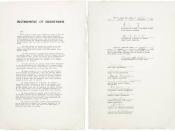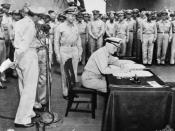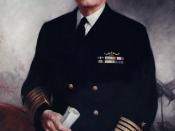By early in 1945 Germany had surrendered and the United States was able to focus on the war in the Pacific. Japan was suffering from a serious lack of oil and was having trouble producing more armaments with which to fight. America had a strong position in the Pacific and was moving ever closer to Japan by the time Germany surrendered.
In the February of 1944 Admiral Chester Nimitz had already been successful in a series of victories, which broke the outer perimeter of the Japanese Empire. The American submarines were taking their toll on Japanese shipping and by the summer of 1944 Japan had very little food, and relatively less oil. In June of 1944 the decisive battles in the war of the Pacific were fought. In June America was able to take control of the Mariana Islands and captured Tinian, Guam, and Saipan, only 1350 miles from Tokyo.
In October, in the Battle of Leyte Gulf the Japanese used virtually all of their fleet to hold off the American intruders, but to no avail. The United States sunk four Japanese aircraft carriers and all but destroyed Japan's ability to continue a naval war with America.
Although the Japanese position was looking more and more hopeless they refused to lay down in front of the Americans. In the battle for Okinawa more than 3,500 Japanese kamikaze, or suicide bombers, were sent to the American and British fleet inflicting major damage, and on land, the Japanese would invade American troops by night. The United States, as a result of the kamikaze and invasions, lost 50,000 troops while the Japanese lost over 100,000. American and British fleets were now 370 miles from Japan, and Japanese forces had been heavily depleted.
The Japanese, by June of 1945, no longer had...


